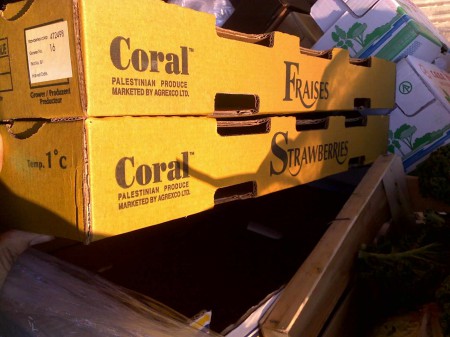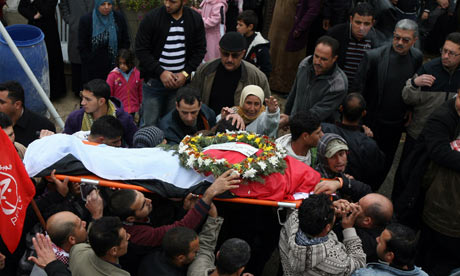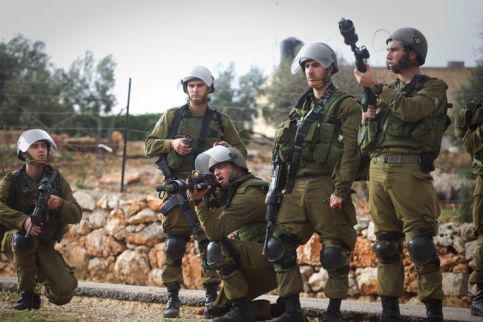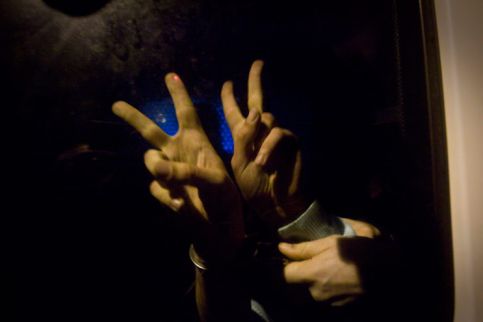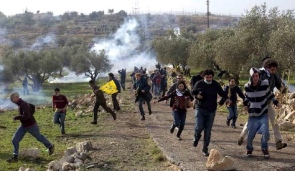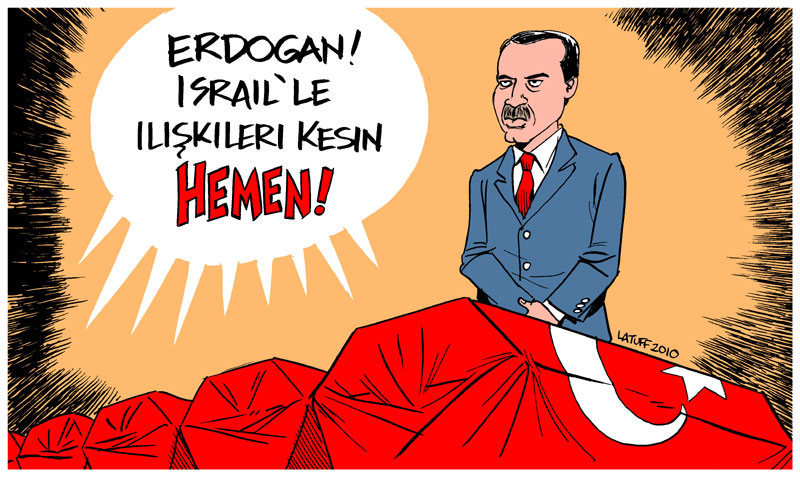EDITOR: The western hypocrisy
The whole world seems to know and care about ONE Israeli soldier caught by Hamas in Gaza few years ago. None of those humanists actually knows or cares at all about the many Palestinian political prisoners – more than 10,000 of them – who are languishing in Israeli jails for many years. One Israeli Jew is obviously more important than ten thousand Palestinians.
Palestinian protesters block France FM from entering Gaza: Haaretz
Demonstrators say infuriated over comments by Michele Alliot-Marie in support of Gilad Shalit; member of Alliot-Marie’s entourage hit in the head.
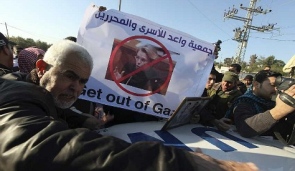
A crowd of furious Palestinian protesters have tried to block the French foreign minister on her way into the Gaza Strip, jumping on her vehicle and lying on the road.
Dozens of protesters surrounded Foreign Minister Michele Alliot-Marie’s convoy and tried to block her passage through the Erez Crossing from Israel on Friday. The protesters were relatives of Palestinian prisoners held in Israeli prisons.
They were angry about comments made by Alliot-Marie on Thursday in support of Gilad Shalit, an the Israel Defense Forces soldier held by Hamas militants in Gaza since 2006.
Hamas spokesman Sami Abu Zuhri said her comments reflected a total bias toward Israel.
Hamas police eventually dispersed the protesters and allowed her through.
A member of Alliot-Marie’s entourage was hit in the head and later examined at Barzilai Medical Center in Ashkelon.
On Friday afternoon, Alliot-Marie visited the southern town of Sderot.
On Thursday, Alliot-Marie met Aviva and Noam Shalit, Gilad Shalit’s parents, in Jerusalem, where she said that Shalit had “been held hostage for over four years. His complete isolation and preventing any sign of life from him is completely inhumane. We demand his immediate release.”
Shalit is a French citizen, and France “is using all its ties in the region to advance his release,” she said.
France’s role in freeing Shalit is secondary because Israel and Hamas chose the German mediator to negotiate the soldier’s release following to his success in dealing with Hezbollah, she said.
Due to the issue’s sensitivity, Alliot-Marie chose not to comment on the talks and the reports about a new deal being negotiated.
Angry protests greet French foreign minister in Gaza: The Guardian
Palestinians pelt Michèle Alliot-Marie’s car with eggs and shoes after she meets family of captive Israeli soldier Gilad Shalit
Protesters attempt to stop the French foreign minister Michele Alliot-Marie’s car as she arrives in Gaza. Photograph: Sipa Press/Rex Features
Palestinian protesters mobbed the car of the French foreign minister, Michèle Alliot-Marie, as she arrived in Gaza today.
Dozens of people attempted to block Alliot-Marie’s convoy and hurled eggs and shoes at her jeep. The protesters banged on the vehicle and yelled at the minister to leave Gaza, Reuters reported.
The protesters, relatives of Palestinians held in Israeli prisons, were furious over comments attributed to the minister a day earlier when she met the parents of Gilad Shalit, an Israeli soldier being held captive by the Islamist group Hamas.
After the meeting Israeli radio quoted Alliot-Marie as saying the continued detention of Gilad Shalit, seized by Palestinian fighters in 2006, was a “war crime”.
A spokeswoman in her entourage told Reuters: “The minister was misquoted by Israeli media over Shalit’s issue.” French reporters travelling with Alliot-Marie said the term “war crime” was actually used by Noam Shalit – Gilad Shalit’s father – and not by the minister.
In her first visit to the region since being appointed foreign minister last year, Alliot-Marie was greeted with hostility by the dozens of demonstrators brandishing photographs of their imprisoned sons and husbands.
Gazans said they were angry that Alliot-Marie had made no mention of the several thousand Palestinians held in Israeli prisons. “Get out of Gaza!” read one banner. “There is one Gilad Shalit but also 7,000 Palestinian prisoners,” said another.
Germany has tried for months to broker a deal to secure Shalit’s release in exchange for hundreds of Palestinian prisoners but the sides are deadlocked over several high-profile inmates.
It has been a torrid week for Alliot-Marie. On Monday the Guardian reported that she had outraged liberals and human rights activists by proposing last week to send French security forces to Tunis to shore up the unpopular regime. Three days later the Tunisian dictator fled to Saudi Arabia.
On Tuesday she was summoned to explain her remarks to the foreign affairs commission of the national assembly, the lower house of parliament, where she said her offer had been “misrepresented” and had been aimed at helping the Tunisian people, not propping up repression. She was “scandalised” that her comments had been distorted.
Alliot-Marie made a short speech to reporters on Friday saying France remained committed to ending the Israeli-Palestinian conflict. “France cares for Gaza. France will not abandon Gaza,” she told Reuters. “I stress to you France’s determination to achieve a dual goal: establishing a Palestinian state and guaranteeing the security of Israel.”
EDITOR: Ban Ki-moon discovers the settlements
As one of Israel’s strongest backers, it is interesting that Ban Ki-moon has just now discovered that settlements are illegal... he used all his powers for years to shield Israel from the implications of its many illegal acts.
UN chief: Settlements are illegal, hamper peace efforts: Haaretz
Palestinians have right to an independent state, Israel has right to live in peace within secure borders, and way must be found for Jerusalem to be capital of two states, Ban Ki-moon tells UN committee.
United Nations Secretary-General Ban Ki-moon slammed Israel’s refusal to halt West Bank settlement building, saying that this refusal seriously hampered peace talks with the Palestinians, AFP reported on Friday.
“Settlements in the occupied Palestinian territory are illegal under international law, contravene the Road Map obligations of Israel, undermine confidence, prejudge the outcome of the permanent status negotiations and hamper efforts at bringing the parties back to the negotiating table,” he told a UN committee dealing with Palestinian issues on Friday.
Earlier in the week, Arab nations submitted a draft resolution to the UN Security Council condemning Israeli settlements in the West Bank, but a vote on it is not expected any time soon because of a likely U.S. veto.
The secretary-general also called for a halt to “irresponsible rhetoric” that questions a two-state Israeli-Palestinian solution and incites hatred and violence.
Palestinians have the right to an independent state, Israel has a right to live in peace within secure borders, and a way must be found for Jerusalem to emerge as the capital of the two states, Ban said.
Diplomats say that the point of the draft resolution condemning settlement building is to highlight Washington’s isolated position on the Security Council, show the Palestinian population that the Palestinian Authority is taking action, and to pressure Israel and the United States on the settlement issue.
Council diplomats said privately that the 15-nation panel was unlikely to take any action on the draft resolution in the near future – if at all – because of the likely veto.
It has nearly 120 co-sponsors, exclusively Arab and other non-aligned nations. UN diplomats said that the draft would probably receive 14 votes in favor and the one veto if put to an immediate vote.
The draft says that “Israeli settlements established in the Palestinian Territory occupied since 1967, including East Jerusalem, are illegal and constitute a major obstacle to the achievement of a just, lasting and comprehensive peace.”
Intensive U.S. diplomatic efforts to revive direct peace talks between Prime Minister Benjamin Netanyahu and Palestinian President Mahmoud Abbas collapsed last year after Israel failed to extend a 10-month freeze on West Bank settlement construction.
Israel has repeatedly called for a resumption of direct negotiations with the Palestinians. But the Palestinians have refused to return to the negotiating table until Israel first agrees to halt settlement work.
Obama must call Israeli settlements illegal: The Guardian
US support for a UN resolution on the settlements would remind Netanyahu that there are consequences for breaking the law
“To veto or not to veto?” That is the agonising question that has President Barack Obama pacing the battlements of the White House waiting to dodge the slings and arrows of outraged Aipac. Provoked by the latest demolition in East Jerusalem, no fewer than 120 countries have sponsored a UN resolution condemning Israeli settlement activity. Hillary Clinton has also condemned it as “illegitimate”, but the resolution introduces precision by terming the settlements as “illegal”.
In a country where “all politics is local”, and in the face of the economic crisis, Obama could almost be forgiven for dropping the ball in the Middle East game. But his response to the current resolution could well determine whether there is any wind left in the sails of the peace flotilla he launched with his speeches in Egypt and Turkey directed at the Muslim world.
Every other member of the UN security council agrees that settlements are illegal, including Britain and France. The international court of justice has affirmed their illegality. The US once called them illegal, then termed them unhelpful, and currently regards them as “unhelpful” and “illegitimate”. Under the road map of 2003, Israel agreed to stop them, but it has ignored the rest of the world and its best friend, the US, and continued to build. Even President Bill Clinton officially reduced the amount of US loan guarantees by the sum spent on settlements.
In the face of Binyamin Netanyahu’s defiance, so far the US response, engineered by Dennis Ross – who seems to have frozen out the official peace negotiator, George Mitchell – has been to attempt to bribe Israel with billions of dollars, free jet fighters and a free “get out of the security council” card in the form of a veto. The handsome offer was for a temporary moratorium.
Washington’s line is to ignore UN decisions and international law and say that it is up to the parties to negotiate such “permanent-status issues”. The state department itself is clearer on the issues. After years of congressional votes, it still balks at moving the US embassy to Jerusalem (which hosts not a single foreign embassy) because, regardless of eventual negotiations, Israel does not have internationally recognised title to the city.
It is as if you have caught someone stealing your car and the police decide to overlook technical issues like the law and ownership and instead tell you to negotiate with the thief to get occasional access to the back seat.
In this week’s security council debate on the resolution, deputy US ambassador Rosemary DiCarlo used theological nicety to explain Washington’s difficulty in supporting a resolution that, on the face of it, reflects US official policy. “We believe that continued settlement expansion is corrosive – not only to peace efforts and the two-state solution – but to Israel’s future itself. The fate of existing settlements is an issue that must be dealt with by the parties, along with the other permanent-status issues – but, like every US administration for decades, we do not accept the legitimacy of continued Israeli settlement activity.”
However, she added: “Permanent-status issues can be resolved only through negotiations between the parties – and not by recourse to the security council. We therefore consistently oppose attempts to take these issues to this council and will continue to do so.”
The US ambassador to the UN, Susan Rice, is usually tactfully absent during such debates, keeping her credibility by allowing deputies to intone the weaselly formulas that disguise the stark truth. Annexation and settlement building are illegal.
Of course, Obama has other problems, such as the economy and healthcare, and on the Middle East must face not only a rabidly pro-Israeli Republican party but also a majority of his own party that would sign up to a resolution declaring the moon to be made of blue cheese if the Israeli lobby demanded it.
Nonetheless, his credibility as president is at stake here. The Republicans do control the House of Representatives, and indeed the chair of the foreign affairs committee is now Ileana Ros-Lehtinen, who outflanks the Israeli government on the right. (She has been trying to de-fund UNRWA, the UN’s agency that provides basic services in the occupied territories, even though the Israeli government, which would have to pay if the UN didn’t, opposes her.) But Congress cannot control the US delegation to the UN.
It is surely time for Obama “to take arms against a sea of troubles, and by opposing end them”. This week, a letter landed on the White House doormat from a phalanx of foreign policy and government professionals urging him to support the resolution. He should take their advice.
The public exasperation implied by support for the security council resolution sends a signal to Netanyahu that there are indeed consequences for ignoring the advice of your best friend, let alone breaking the law. It might make the Israeli prime minister more amenable, and it would certainly send a signal to the Israeli electorate that Netanyahu had terminally alienated the White House.
It would not alienate the American electorate, not even American Jews. Those who support Netanyahu tend to be those who think the president is a foreign-born crypto-Muslim anyway. It would bring cheer to the J-Street movement, whose peacenik views more closely reflect those of most American Jews than Likud does.
And it would do more than any other single act to demonstrate respect for international law and restore the credibility of American diplomacy.
Indeed, Obama could follow up and demand the IRS check on the tax deductibility of American “charities” and foundations that bankroll settlement building, including Irving Moskowitz, who recycles the proceeds of inner-city gambling in the US to buy and demolish property in East Jerusalem, such as the Shepherd Hotel, with the conscious aim of frustrating the declared policy of every US government since 1967. Some of the money, however, he sends as donations to politicians like Ileana Ros-Lehtinen.
